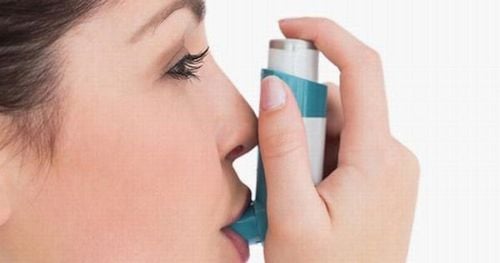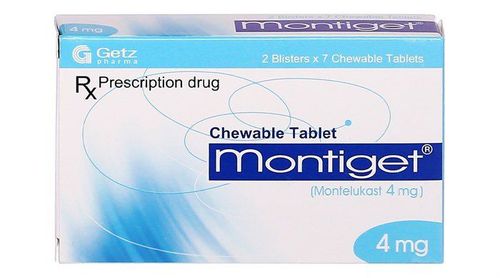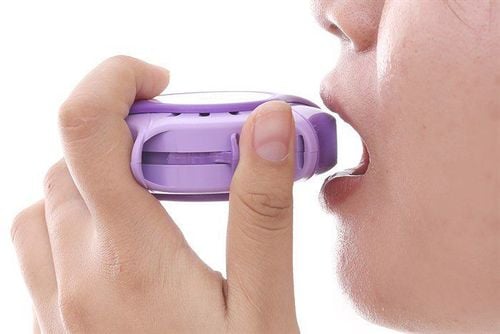This is an automatically translated article.
The drug Telkast has the main ingredient montelukast, which has a selective leukotriene receptor antagonist effect and helps inhibit bronchospasm. The drug is indicated for the treatment of bronchial asthma, allergic rhinitis and the prevention of exercise-induced bronchospasm.1. What are the effects of Telkast?
Telkast drug has the main ingredient is montelukast. The drug's mechanism of action is selective resistance to leukotriene receptors, thereby helping to inhibit bronchospasm. Montelukast is rapidly absorbed after oral administration, with mean peak plasma concentrations occurring within 3-4 hours. The oral bioavailability of the drug is 64%. More than 99% of montelukast is bound to plasma proteins. Montelukast is extensively metabolised in the liver and eliminated primarily via the biliary tract. Therefore, Telkast drug is indicated in the following diseases:
Prevention and treatment of chronic bronchial asthma. Exercise-induced bronchospasm Allergic rhinitis : Symptomatic treatment of seasonal allergic rhinitis and perennial allergic rhinitis.
2. Dosage of the drug Telkast
2.1 Adults and Adolescents 15 Years of Age and Older Chronic Asthma: Telkast should be used once a day in the evening. The recommended dose in adults and adolescents 15 years of age and older is 1 10 mg tablet.
Exercise-induced bronchospasm in patients 15 years of age and older: Patients should take a single 10 mg dose of montelukast at least 2 hours before exercise or strenuous exercise. Accordingly, patients only take a single dose within 24 hours. If montelukast is already taken every other day for another indication, no additional dose is needed to prevent exercise-induced asthma.
Allergic Rhinitis: Patients with allergic rhinitis should take Telkast once a day. Efficacy has been demonstrated when montelukast is administered in the morning or evening and is not related to meal timing. The recommended dose in adults and adolescents 15 years of age and older is 1 10 mg tablet daily.
2.2 Children Chronic Asthma:
Telkast should be used once a day in the evening. With dosages corresponding to each age as follows:
Children from 6-14 years old: take 1 tablet 5 mg/day Children from 2-5 years old: take 1 tablet 4mg/day Children from 12 - 23 months Age: Need to consult a doctor. Allergic Rhinitis:
Children with allergic rhinitis should take Telkast once a day. The time of taking the drug depends on each subject with the corresponding dosage as follows:
Children from 6-14 years old: 1 tablet of 5 mg/day Children from 2 to 5 years old: 1 chewable tablet 4mg/day Safety and The efficacy of Telkast in children under 2 years of age with allergic rhinitis has not been established.
2.3 Special populations Patients with hepatic impairment: No dose adjustment of Telkast is required in patients with mild to moderate hepatic impairment. The pharmacokinetics of montelukast in patients with severe hepatic impairment or hepatitis have not been evaluated. Patients with renal impairment: Because montelukast and its metabolites are not excreted in the urine, the pharmacokinetics of montelukast have not been evaluated in patients with renal impairment. No dose adjustment of Telkast is recommended in these patients. Elderly: No dose adjustment of Telkast is required in the elderly.
3. Telkast . side effects
When using Telkast, patients may experience side effects including:
Frequency from 1 to 10%:
Dermatology: Atopic dermatitis, eczema, skin infection, skin rash, urticaria Gastrointestinal: Abdominal pain, diarrhea, dyspepsia, gastroenteritis, nausea, tooth infection, toothache Genitourinary system: Hematuria Liver: Increased serum ALT, increased serum AST Infection: Influenza, varicella zoster infection , viral infection Nervous system: Dizziness, fatigue, headache Neuromusculoskeletal: Asthenia Ophthalmology: Conjunctivitis, myopia Otitis: Ear pain, otitis media Frequency unknown:
Cardiovascular: Edema, eosinophilic granulomatosis with polyangiitis, palpitations, vasculitis Dermatology: Erythema multiforme, erythema nodosum, pruritus, Stevens-Johnson syndrome, toxic epidermal necrolysis Gastrointestinal: Pancreatitis, vomiting Genitourinary: Urinary incontinence Hematologic: Bruising, eosinophilia, thrombocytopenia
4. Notes when using Telkast
Eosinophils and vasculitis: In rare cases, patients may present with systemic eosinophilia, sometimes with clinical manifestations of vasculitis with eosinophilic granulomas and polyarteritis (formerly known as Churg - Strauss). These clinical features may include eosinophilia, vascular rash, worsening lung, cardiac complications, and/or neuropathy. Asthma: Montelukast is not FDA-approved for use in reversing bronchospasm during acute asthma attacks. However, some studies support its use as an adjuvant therapy. Treatment with montelukast can be continued during asthma exacerbations. There have been reports of neurological disorders in patients taking montelukast, including adults, adolescents, and children. Symptoms include agitation, aggression, hostility, anxiety, depression, nightmares, hallucinations, insomnia, hyperactivity, sleepwalking, suicidal thoughts and actions, and tremors. Physicians and patients should be alert to possible neurological disturbances. A careful risk-benefit assessment should be made to decide whether montelukast should be continued in the presence of these symptoms.
5. Drug interactions
Here are some drug interactions to watch out for when using Telkast:
Gemfibrozil: May increase serum concentrations of montelukast. Therefore, it is necessary to monitor the effectiveness and side effects when using the two drugs simultaneously. Loxapine: Using Telkast may increase the side effects of loxapine. Lumacaftor: Serum concentrations of montelukast may be decreased when used in combination with lumacaftor Somatropin: Co-administration of somatotropin with montelukast may increase the risk or severity of myopathy, rhabdomyolysis. In order to avoid drug interactions, patients need to inform their doctors about the medicines they are using, including drugs, foods, herbs,...
The article has provided information about the uses, Dosage and precautions when using Telkast. Patients should consult their doctor and pharmacist before taking to ensure the safety and effectiveness of the drug.
Follow Vinmec International General Hospital website to get more health, nutrition and beauty information to protect the health of yourself and your loved ones in your family.
Please dial HOTLINE for more information or register for an appointment HERE. Download MyVinmec app to make appointments faster and to manage your bookings easily.













